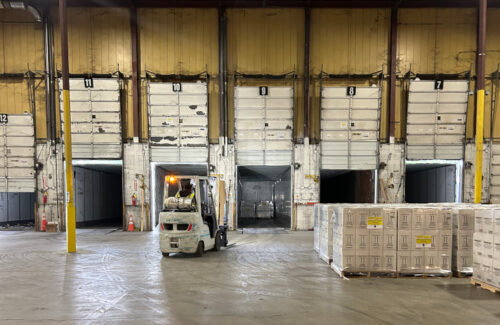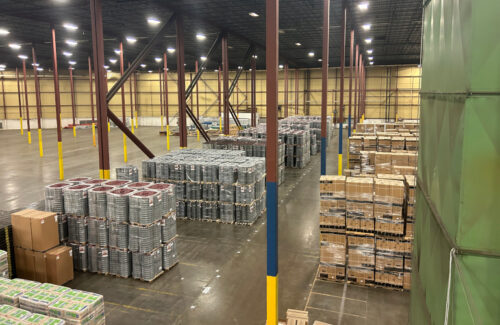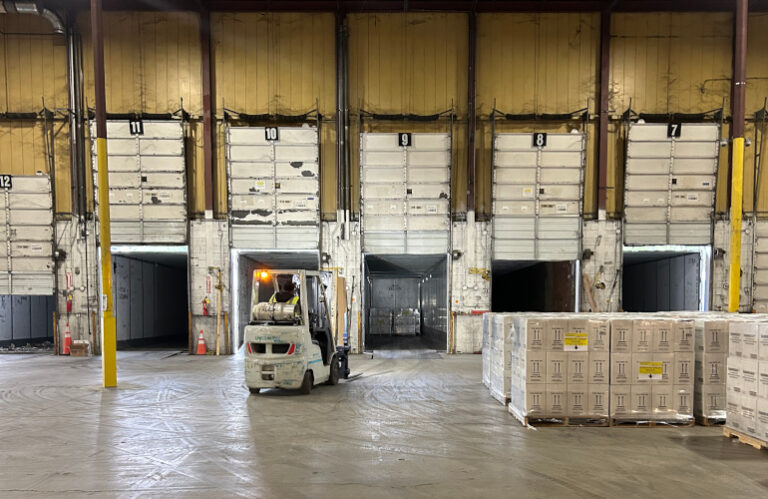America’s solar supply chains have come under more scrutiny over the past four years than ever before. Successive governments have imposed significant tariffs on the import of solar panel components. The steep tariffs imposed on imports of solar panels threaten to drive prices for the components to potentially unsustainable levels.

Broad logistics
When the Biden administration postponed the final rounds of module tariffs until June 2024, it sparked a buying frenzy among solar EPCs trying to purchase as much product as possible before prices increase significantly.
An unintended consequence, however, is that EPCs need a place to store the modules they purchase. Long lines for interconnection slow down the progress of projects across the country, and instead of going straight from the supplier to the field, these modules need to be stored somewhere.
With margins tighter than ever, most EPCs are hesitant to buy or build their own warehouses. The easiest way for these companies to find storage space that suits their needs is to use third-party warehousing and logistics partners. As third-party suppliers become more accessible in the United States, the solar industry may discover the benefits that storage brings.
Here are eight reasons why solar EPCs should consider seeking third-party partners for their storage needs:
1. The costs of third-party storage and logistics are much lower than those of purchasing or building their warehouses. Construction costs continue to rise and the Federal Reserve shows no signs of lowering interest rates to make it easier to borrow money to purchase buildings. Finding a third-party warehousing and logistics partner that can scale up and down as market forces change is critical.

Broad logistics
2. Some third-party providers offer flexible-term leases – a benefit for EPCs that don’t need long-term storage space if the interconnection queue runs out. Companies that use third-party warehouses pay only for the space they need for the time they need, eliminating the need to invest capital in hiring and training their own warehouse and logistics team. This can save companies money in the long run as they can quickly scale up and down in response to market demand. Additionally, external partners can provide expertise, knowledge and access to additional resources that EPCs may not have access to.
3. The right external warehousing and logistics partners can bundle services such as warehouse management, kitting, sorting and custom packaging. When a partner can remove some of the more mundane tasks from an EPC’s agenda, the company can do what it does best: financing, designing and building solar projects. It is critical to work with a partner who can provide these services along with the ebbs and flows of the solar industry.
4. To give EPCs a clear insight into their inventory, renowned third-party warehousing and logistics partners have the latest inventory management technology. The more accurate the inventory management, the lower the costs for EPCs trying to keep overhead low to price their projects competitively. According to a 2022 McKinsey report, companies that deploy tracking software and other technologies are twice as likely to avoid supply chain disruptions, which can mean the difference between a project’s success or failure.
5. Third-party storage and logistics providers may be able to coordinate the transportation of solar components from manufacturers to project sites. This allows internal logistics teams to focus on large-scale strategies.
6. If the components come from abroad, a reliable third-party warehousing and logistics team can manage customs clearance, documentation and compliance with applicable import regulations. By minimizing issues as modules arrive, project timelines can be shortened and delivered on time and on budget.
7. Sometimes, despite the precautions taken, parts are damaged during transport. Third party warehouse and logistics teams can return damaged parts at the direction of EPC management, making the process much easier.
8. Finally, third-party warehousing and logistics partners may be able to assist with the recycling or disposal of waste solar panels used in projects, keeping the supply chain sustainable and efficient.
Until the solar industry stabilizes and just-in-time delivery of solar components becomes the norm again, solar EPCs will need facilities to store excess inventory. They should consider finding a reliable third-party warehouse and logistics partner that can meet their current and future storage needs.
Eric Burdette is the COO of BroadRange Logistics, a leading end-to-end provider of ultra-flexible warehousing and fulfillment services. Serving companies of all sizes, BroadRange provides comprehensive short- and long-term solutions, allowing companies to effortlessly navigate the complexities of supply chain management, including warehousing, fulfillment and other value-added services. BroadRange has extensive experience serving some of the world’s largest solar companies with their storage and distribution needs.


